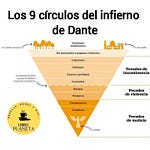Como veis estamos justo antes de entrar en la ciudad de Dite, que es la ciudad del demonio o Lucifer que, como vemos, vive en el último círculo del Infierno.
En este círculo primero vemos a los iracundos, donde nos encontramos con Flegias y con Filipo Argenti, uno de los más importantes enemigos de Dante. Por último, Dante y Virgilio esperan la llegada del mensajero de Dios que obligue a los demonios a abrirles las puertas de la ciudad infernal.
Filippo Argenti intenta tirar a Dante de la barca, Gustavo Doré.
Infierno, Canto VIII, Dante y Virgilio desembarcan en la ciudadela de Dite, por Gustavo Doré.
Además de los libros que utilizo por regla general, he incorporado información de otras páginas:
Mitos, Leyendas y Otras Criaturas - Flegias.
Por último, como siempre, os dejo la magnífica entrada de Vashik Armenikus. Insiste en una idea que ya he recogido en el podcast:
It is one thing to fall into sin through weakness, another to embrace it by deliberate choice. Beyond the iron walls of the accursed city of Dis, we shall encounter sinners of intellect—those whose transgressions were not born of impulse, like lust, gluttony, or wrath, but of a deliberate embrace of evil.
Continúa después:
From this point forward, every sin is a deliberate one—the product of corrupted reason and distorted judgment. This is why, in my interpretation of Virgil in the first canto of Inferno, I did not see him as merely symbolising intellect or reason, but rather a reason illuminated by divine grace. For without grace, reason cannot truly be called ‘the good of the intellect.’
When Virgil stands before the rebel angels, it is, essentially, a confrontation between uncorrupted reason (Virgil) and reason that has been perverted (the rebels). Who could win in such a opposition?
Y concluye:
Without the divine intervention our reason hesitates and ‘yes and no contend’ within our mind. Indecision. Reason alone is sufficient to confront sins of the flesh—gluttony, lust—but when faced with deliberate sins, the sins of the mind, it falters unless aided by divine intervention. This is why Dante places the scene with Argenti and the defiance of the rebel angels within the same canto. He reveals how easily reason can cast aside a sinner of the flesh like Argenti, yet how it struggles against sins rooted in the intellect.
Así terminamos este Canto. El próximo día tocará el Canto IX, en el que aún estamos en el Círculo de los Iracundos.
Buy me a coffee. ☕️















Share this post